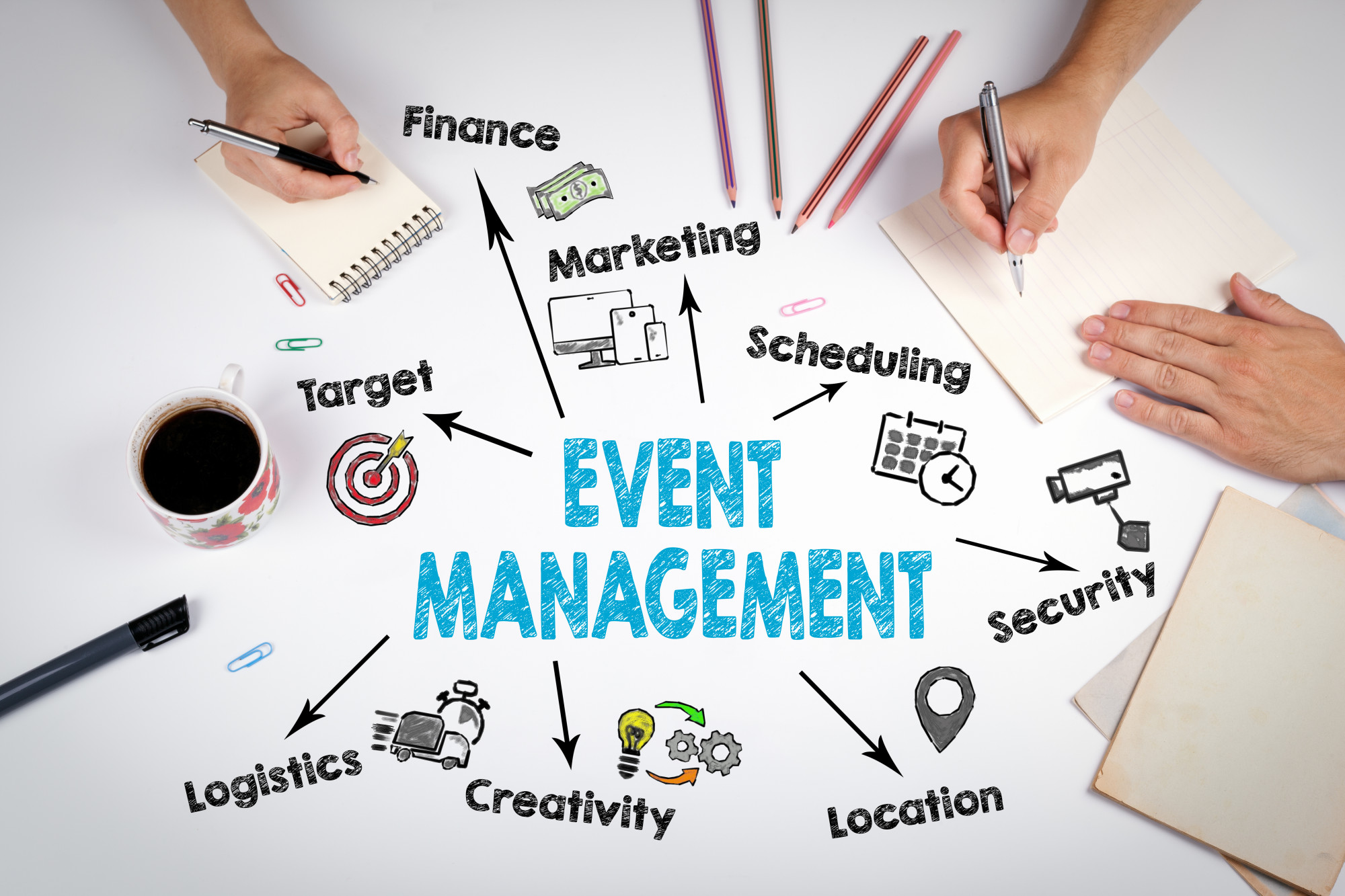A beginner’s manual to hiring charlotte event companies for special occasions
A Deep Study Exactly How Event Management Works to Produce Remarkable Experiences
Event management is a complex self-control that combines various elements to craft memorable experiences. It calls for a clear understanding of the event's purpose and audience. Organizers have to navigate budgeting, logistics, and marketing to ensure a smooth execution. Each part plays a vital role in accomplishing the wanted influence. The journey does not finish with the event itself. There are understandings to uncover that can shape future ventures.
The Basics of Event Management
Reliable event management includes a variety of vital concepts that lead the preparation and execution of effective occasions. At its core, it includes understanding the event's purpose, audience, and wanted outcomes. Determining the target group is critical, as it educates decisions connected to web content, advertising, and logistics.
Budgeting is an additional basic facet, ensuring that resources are designated efficiently while fulfilling the event's objectives. This consists of preparation for unforeseen costs that might occur.
Time management plays a vital duty, as event supervisors have to create an in-depth timeline to collaborate various jobs and turning points.
In addition, efficient interaction among stakeholders, vendors, and staff member is crucial to ensure alignment and stay clear of misunderstandings.
Ultimately, risk management need to be thought about, with contingency strategies in position to attend to potential difficulties, therefore improving the total experience for participants and ensuring a seamless execution of the event. (charlotte event companies)

Secret Duties in Event Planning
In event planning, comprehending vital duties is important for effective implementation. The event organizer is in charge of looking after logistics and guaranteeing all elements line up with the vision. In addition, efficient vendor management is crucial for keeping quality and promoting solid partnerships throughout the preparation procedure.
Event Coordinator Obligations
An event coordinator manages the complex components of event preparation, guaranteeing seamless implementation from conception to verdict. They are accountable for conceiving the event style, establishing budget plans, and developing timelines to maintain the project on the right track. Control with stakeholders, consisting of customers, venue managers, and volunteers, is important to straighten expectations and help with interaction. The organizer additionally looks after logistics, such as catering, transport, and innovation requires, making sure all parts function harmoniously. They perform site brows through, take care of routines, and troubleshoot concerns that may occur throughout the event. Post-event, the organizer examines the event's success, collecting responses and evaluating results to inform future tasks. This multifaceted duty calls for strong business abilities, focus to detail, and reliable social interaction.
Supplier Management Essentials
Steering via the landscape of vendor management is necessary for effective event preparation. Reliable vendor management involves determining, picking, and collaborating distributors that offer critical solutions, such as event catering, audiovisual assistance, and decoration. Event planners have to maintain strong communication with vendors to guarantee that all aspects align with the event's vision. Secret duties include the vendor manager, that looks after contracts and settlements, and the logistics planner, in charge of on-site arrangement and implementation. It's necessary to develop clear expectations and timelines, cultivating a collective setting that improves the general experience. By prioritizing these aspects, event organizers can browse prospective obstacles, making sure that every information contributes to a seamless and remarkable event.
Crafting a Vision: Concept Development

When a vision is developed, it comes to be necessary to equate it into workable components. This consists of specifying the ambience, choosing suitable venues, and identifying the event's style. Collaborating with stakeholders, including enrollers and partners, better fine-tunes the idea, making sure that all events share a merged understanding of the event's objective. Eventually, a strong vision not only boosts participant engagement however additionally sets the stage for remarkable experiences that reverberate long after the event ends.
Budgeting and Resource Allotment
With a clear vision in area, the next action in event management includes mindful budgeting and source appropriation. This essential phase assurances that all needed components are funded and aligned with the event's purposes. Event supervisors start by estimating prices connected with venue option, catering, entertainment, and advertising and marketing. They create a comprehensive budget plan that details each category, permitting for openness and responsibility.
Resource appropriation prolongs beyond finances; it additionally encompasses human resources. Determining team duties, duties, and timelines is crucial to guarantee performance. Event supervisors need to also think about backups for unexpected expenditures or changes in scope, establishing a buffer within the budget.
Furthermore, prioritizing costs on aspects that boost visitor experiences is important. By tactically allocating sources, event supervisors make the most of effect while maintaining monetary control. This self-displined method not just promotes successful occasions however likewise develops credibility and count on with stakeholders and individuals.
Logistics: The Backbone of Event Implementation
While budgeting lays the foundation for an occasion, logistics offer as its backbone, guaranteeing that every element is implemented efficiently and successfully. charlotte event companies. This incorporates a vast array of tasks, consisting of location selection, transport arrangements, and equipment procurement. Efficient logistics management calls for careful planning and sychronisation to guarantee that all elements align with the event's timeline and objectives
Trick components of logistics consist of inventory management, where supplies and products are tracked to avoid scarcities, and staffing, which entails recruiting and training personnel to take care of numerous tasks. Interaction is additionally crucial, as it facilitates cooperation amongst suppliers, sponsors, and the event team.

Advertising And Marketing and Promo Strategies
Effective marketing and promotion methods are necessary for making the most of presence and involvement at an event, as they produce interest and exhilaration among potential individuals. Event managers employ a mix of typical and electronic advertising and marketing methods to reach their target market. Social media site systems, e-mail projects, and targeted advertisements are generally utilized to produce buzz and foster community interaction. Collaborations with influencers or market leaders can enhance reputation, while involving web content such as videos and endorsements can reverberate with potential guests.
Furthermore, leveraging event-specific hashtags and creating shareable graphics urges natural promo amongst attendees. Early bird ticket offers and exclusive promos can incentivize enrollment, additionally boosting interest. A well-designed web site that supplies simple navigating and clear info concerning the event can enhance the individual experience. By carrying out these advertising and marketing and promo strategies, event supervisors can ensure greater visibility and eventually develop a remarkable experience for all individuals.

Gauging Success: Responses and Assessment
Success in event management rests on durable comments and analysis systems. These processes are important for identifying the efficiency of an occasion and recognizing areas for renovation. By collecting input from attendees, coordinators can evaluate satisfaction degrees, recognize choices, and evaluate total effect. Surveys and meetings offer as useful devices for gathering quantitative and qualitative data, permitting for complete analysis.
Furthermore, examining crucial performance indications (KPIs) such as participation prices, involvement degrees, and roi (ROI) supplies a more clear image of event success. Post-event debriefing sessions with the preparation team additionally add insights, promoting a culture of continual renovation.
Eventually, an organized strategy to responses and assessment not just boosts future events however also reinforces relationships with stakeholders. By applying these methods, event managers can create memorable experiences that reverberate with participants and drive ongoing involvement.
Regularly Asked Questions
Just How Do Event Managers Deal With Unanticipated Obstacles Throughout an Occasion?
Event managers address unforeseen challenges by staying calmness, evaluating the situation, and applying backup plans - charlotte event companies. They connect efficiently with their group, adjust promptly, Source and prioritize options to guarantee the event continues smoothly and successfully
What Modern Technology Devices Are Important for Modern Event Management?
Essential technology tools for modern-day event management include event registration software, task management applications, attendee interaction platforms, and analytics tools. These sources simplify processes, boost interaction, and enhance total event experiences for coordinators and individuals alike.
Just How Do Social Differences Influence Event Planning and Implementation?
Cultural differences substantially affect event planning and implementation. They affect styles, custom-mades, interaction styles, and assumptions, requiring customized strategies to assure inclusivity and regard, ultimately forming the general experience and success of the event.
What Are the Moral Factors To Consider in Event Management?
Ethical considerations in event management encompass openness, sustainability, social level of sensitivity, and inclusivity. Planners should focus on justness, regard diverse target markets, decrease environmental impact, and assurance ease of access to create accountable and unforgettable experiences for all individuals.
Just How Can Sustainability Be Integrated Into Event Planning?
Sustainability can be integrated right into event preparation by making use of eco-friendly materials, reducing waste, sourcing local suppliers, applying carbon offset programs, and promoting electronic solutions to decrease paper use, consequently enhancing environmental awareness within the event's framework.